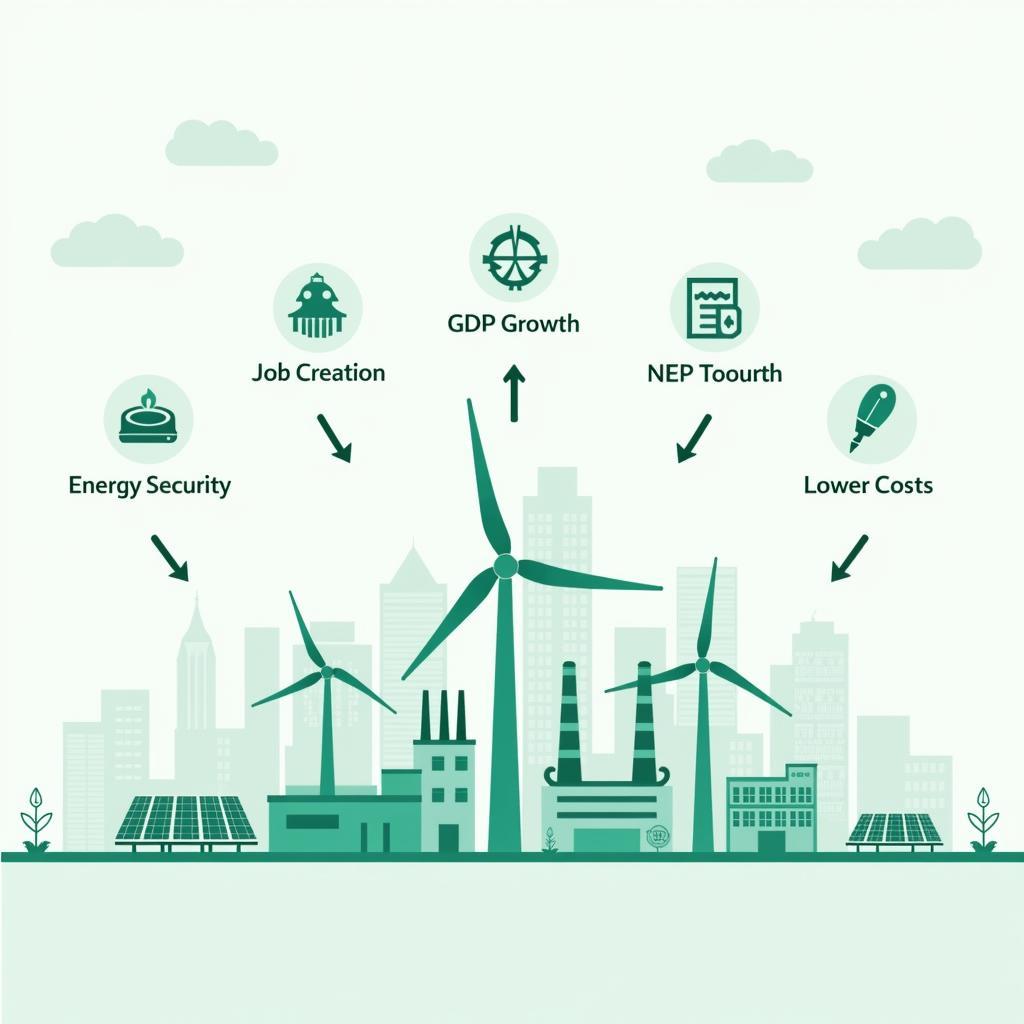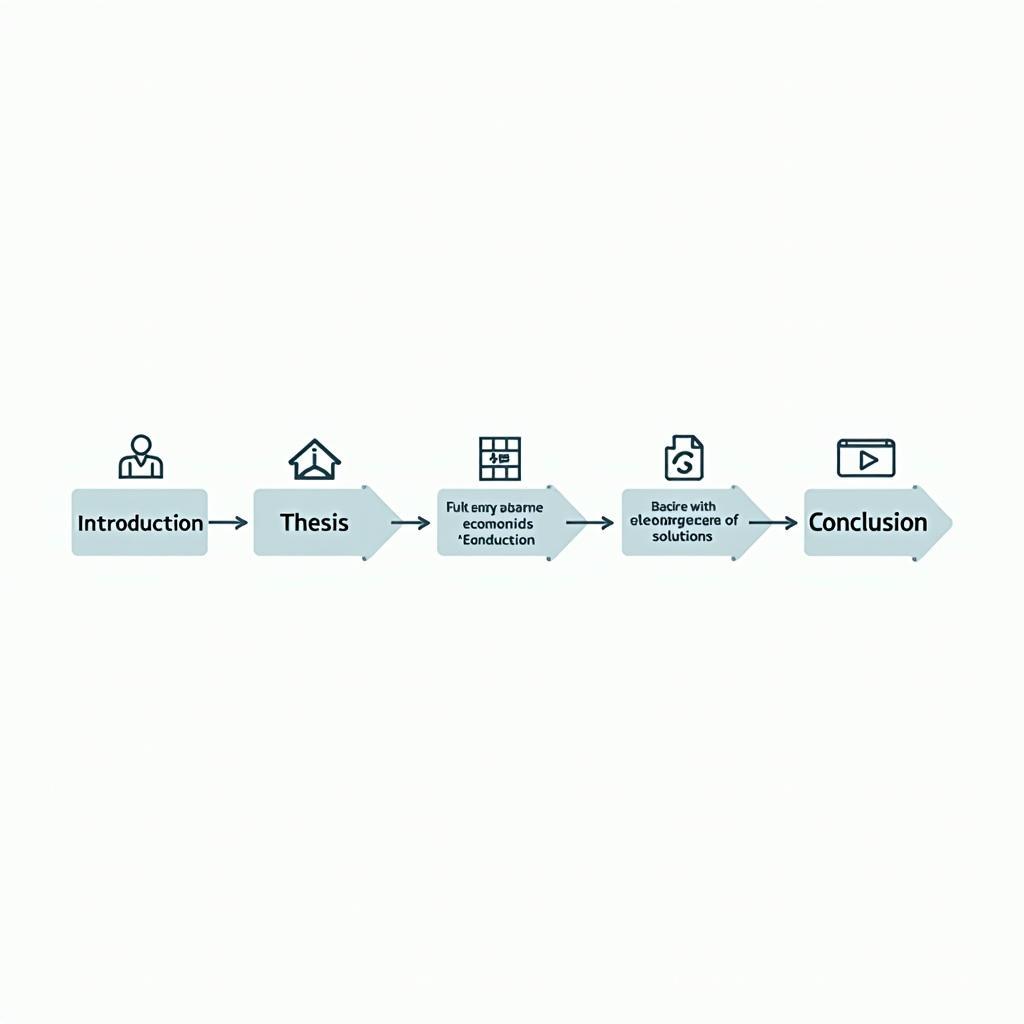Mở bài
Chủ đề năng lượng tái tạo xuất hiện thường xuyên trong IELTS Writing Task 2 vì chạm tới ba mối quan tâm lớn: kinh tế, môi trường và chính sách công. Với người học, việc nắm vững cách khai thác “Benefits Of Renewable Energy For The Economy” không chỉ giúp bạn có ý tưởng mạnh mà còn thể hiện khả năng lập luận, triển khai ví dụ, và dùng ngôn ngữ học thuật chính xác. Trong bài viết này, bạn sẽ học: 3 bài mẫu band 5-6, 6.5-7 và 8-9; phân tích chấm điểm chi tiết; chiến lược xử lý đề; hệ thống từ vựng và cấu trúc ăn điểm; checklist tự đánh giá. Một số đề thực tế (tham khảo từ IELTS Liz – Environment topics, British Council và IELTS-Blog – reported questions) bao gồm:
- Fossil fuels are the main source of energy. In some countries, the use of alternative energy sources is encouraged. To what extent is this a positive or negative development?
- Some people think governments should increase the use of renewable energy to reduce economic dependency on oil and gas. To what extent do you agree or disagree?
- Developing renewable energy can create jobs and boost local economies, but may be costly. Do the advantages outweigh the disadvantages?
Để nhìn bức tranh tổng thể về chính sách và mục tiêu toàn cầu, bạn có thể tham khảo why renewable energy should be a global priority: https://vn.ielts.net/why-renewable-energy-should-be-a-global-priority/
 Hinh anh ve benefits of renewable energy for the economy va IELTS Writing Task 2
Hinh anh ve benefits of renewable energy for the economy va IELTS Writing Task 2
1. Đề Writing Part 2
Some people argue that governments should prioritise investment in renewable energy because it delivers economic benefits such as job creation and energy security. To what extent do you agree or disagree?
Dịch đề: Một số người cho rằng chính phủ nên ưu tiên đầu tư vào năng lượng tái tạo vì nó mang lại lợi ích kinh tế như tạo việc làm và an ninh năng lượng. Bạn đồng ý hay không và ở mức độ nào?
Phân tích đề bài:
- Dạng câu hỏi: Opinion (To what extent do you agree or disagree?). Bạn cần nêu rõ lập trường và duy trì xuyên suốt.
- Thuật ngữ quan trọng:
- Renewable energy: năng lượng tái tạo (gió, mặt trời, thủy điện, sinh khối…)
- Job creation: tạo việc làm
- Energy security: an ninh năng lượng (giảm phụ thuộc nhập khẩu, ổn định giá)
- Prioritise investment: ưu tiên đầu tư (ngân sách, ưu đãi thuế, hạ tầng lưới điện)
- Lỗi thường gặp:
- Viết lan man sang môi trường mà bỏ quên trục “lợi ích kinh tế”.
- Thiếu đối trọng (costs, intermittency) nên lập luận một chiều, dễ bị trừ Task Response.
- Dùng số liệu bịa đặt; thay vào đó hãy dùng xu hướng, ví dụ logic.
- Sai mạo từ/the, sai thì và giới từ (đặc biệt với danh từ không đếm được như investment, employment).
- Cách tiếp cận chiến lược:
- Mở bài: nêu quan điểm rõ ràng (agree/mostly agree/partly).
- Thân bài 1: lợi ích kinh tế cụ thể (việc làm, chuỗi cung ứng, đổi mới).
- Thân bài 2: phản biện chi phí/gián đoạn + giải pháp (lưới điện thông minh, đào tạo lại).
- Kết bài: tái khẳng định lập trường, nhấn mạnh điều kiện để tối đa hóa lợi ích.
Để kết nối chủ đề năng lượng với phát triển bền vững, bạn có thể xem the role of technology in promoting sustainable development: https://vn.ielts.net/the-role-of-technology-in-promoting-sustainable-development/
 So do bang buoc lap luan benefits of renewable energy for the economy trong bai IELTS
So do bang buoc lap luan benefits of renewable energy for the economy trong bai IELTS
2. Bài mẫu Band 8-9
Giới thiệu: Bài Band 8-9 có lập trường rõ, triển khai sâu, dẫn giải logic, dùng bằng chứng khái quát hợp lý, từ vựng đa dạng và cấu trúc câu linh hoạt.
Bài luận (≈300 words):
While environmental imperatives often dominate the debate on renewables, I strongly agree that governments should prioritise this sector for its clear economic dividends. In fact, renewables can catalyse broad-based growth through job creation across manufacturing, installation, and maintenance as well as through enhanced energy security that shields economies from volatile fossil-fuel prices.
First, renewable industries generate employment not only in high-tech roles but also in traditional trades. Building wind turbines and solar farms stimulates domestic supply chains—from steel and glass to software and grid services—thereby multiplying local value added. Crucially, this ecosystem fosters innovation spillovers: firms competing to improve battery storage, forecasting software, and power electronics often pioneer technologies that migrate into other sectors, lifting productivity economy-wide.
Second, prioritising renewables fortifies energy security. Countries reliant on imported oil and gas are exposed to price shocks that strain household budgets and business margins. By diversifying the energy mix with wind, solar, hydro and geothermal, governments can stabilise input costs for industry and reduce current-account pressures. As levelised costs of renewables have fallen rapidly, well-designed procurement and grid upgrades can deliver competitively priced electricity, improving firms’ export competitiveness.
Admittedly, the transition entails upfront costs and the challenge of intermittency. Yet these concerns are manageable. Targeted public investment in smart grids, interconnectors, and storage mitigates variability, while reskilling programmes help workers shift from declining fossil-fuel sectors into sunrise industries. Moreover, transparent auctions and stable policy frameworks crowd in private capital, reducing the fiscal burden.
In sum, the economic case for prioritising renewables is compelling: more resilient labour markets, more predictable energy prices, and a deeper innovation base. Rather than a trade-off, the shift represents a strategic industrial policy that future-proofs competitiveness while advancing environmental goals.
Phân tích Band điểm
| Tiêu chí | Band | Nhận xét |
|---|---|---|
| Task Response (Hoàn thành yêu cầu) | 8.5 | Trả lời trực tiếp câu hỏi, quan điểm rõ ràng và nhất quán; phát triển 2 luận điểm kinh tế (việc làm và an ninh năng lượng) có phản biện và giải pháp. Thiếu số liệu nhưng bù lại bằng lập luận vững và tính khả thi. |
| Coherence & Cohesion (Mạch lạc & Liên kết) | 8.5 | Bố cục 4 đoạn chuẩn chỉnh; chủ đề câu dẫn dắt mạch lạc; dùng từ nối tinh tế (admittedly, in sum). Liên kết ý nội đoạn mượt với các cụm danh từ lặp có kiểm soát. |
| Lexical Resource (Từ vựng) | 8.5 | Vốn từ học thuật đa dạng: levelised costs, supply chains, spillovers, procurement, interconnectors. Collocations tự nhiên, chính xác. Hạn chế tối thiểu việc lặp từ. |
| Grammatical Range & Accuracy (Ngữ pháp) | 8.0 | Phối hợp nhiều cấu trúc: mệnh đề quan hệ, cụm phân từ, câu điều kiện ẩn. Gần như không lỗi; dấu phẩy và song song hóa tốt. |
Các yếu tố giúp bài này được chấm điểm cao
- Trục lập luận bám sát “benefits of renewable energy for the economy”, không sa đà môi trường.
- Phản biện chi phí và intermittency kèm giải pháp cụ thể (smart grids, storage, auctions).
- Collocations học thuật chính xác: energy mix, current-account pressures, export competitiveness.
- Ví dụ khái quát theo chuỗi cung ứng, không bịa số liệu; giọng điệu khách quan.
- Kết luận nêu tầm chiến lược: strategic industrial policy, tạo ấn tượng chiến lược dài hạn.
- Liên kết ý tự nhiên bằng danh từ hóa: diversification, stabilise input costs, innovation base.
3. Bài mẫu Band 6.5-7
Giới thiệu: Bài band 6.5-7 trả lời trọn vẹn, có ví dụ, nhưng phạm vi từ vựng và độ tinh tế lập luận chưa sâu; vẫn có vài chỗ lặp từ/cấu trúc.
Bài luận (≈265 words):
Many people believe that renewable energy should be a top priority for governments because it helps the economy. I mostly agree since it can create jobs and make countries less dependent on imported fuel, although the transition is not easy.
On the one hand, renewables bring employment in different stages. Workers are needed to produce panels and turbines, to install them, and to maintain them for years. Local companies can also supply parts and services, which supports small businesses and regional growth. In addition, when more clean power is available, electricity prices can become more stable in the long term, which helps factories plan investment.
On the other hand, there are valid worries. The initial cost of large wind or solar projects can be high, and the power is not constant when the sun is not shining or the wind is weak. However, these problems can be reduced by improving the grid and using energy storage. Governments can also offer training so workers from fossil-fuel industries can move to new jobs. With clear policies and fair tenders, private companies will invest, and public spending does not have to cover everything.
Overall, prioritising renewables is economically sensible. In my view, job creation, more stable energy prices, and greater energy security outweigh the difficulties, especially if countries plan the transition carefully and keep upgrading their energy systems.
Phân tích Band điểm
| Tiêu chí | Band | Nhận xét |
|---|---|---|
| Task Response (Hoàn thành yêu cầu) | 7.0 | Lập trường rõ, đủ 2 mặt lợi–hại và có giải pháp. Phát triển ý chưa sâu như bài band 8-9 (thiếu chiều rộng như spillovers, xuất khẩu). |
| Coherence & Cohesion (Mạch lạc & Liên kết) | 7.0 | Bố cục rõ ràng; từ nối cơ bản but, however, overall; một số lặp từ “renewables” và “jobs” nhưng chấp nhận được. |
| Lexical Resource (Từ vựng) | 6.5 | Từ vựng phù hợp chủ đề nhưng chưa đa dạng; thiếu collocations nâng cao; một số cụm khá chung chung (big projects, improve the grid). |
| Grammatical Range & Accuracy (Ngữ pháp) | 7.0 | Câu phức xuất hiện đều; lỗi nhỏ về mạo từ và số nhiều hầu như không đáng kể. |
So sánh với bài Band 8-9
- Bài 8-9 có chiều sâu kinh tế (value added, current-account, auctions) và tính hệ thống; bài 6.5-7 dừng ở mức hợp lý, an toàn.
- Từ vựng 8-9 học thuật, giàu collocations; bài 6.5-7 dùng từ phổ thông hơn.
- Phản biện 8-9 kèm giải pháp cụ thể và cơ chế chính sách; 6.5-7 mới dừng ở “improve the grid” và “training”.
Để mở rộng vốn ý tưởng về đầu tư và lợi ích kinh tế, xem thêm the benefits of investing in renewable energy: https://vn.ielts.net/the-benefits-of-investing-in-renewable-energy/
4. Bài mẫu Band 5-6
Giới thiệu: Bài band 5-6 thường có ý chính nhưng phát triển chưa sâu, liên kết đơn giản, từ vựng hạn chế và lỗi ngữ pháp/mạo từ/giới từ.
Bài luận (≈260 words):
Some people say governments should spend more money on renewable energy because it helps economy. I agree in general, but there are problems that cannot be ignored.
Firstly, renewable energy create many jobs for people. There are workers who make the panels and turbine, and people who install it on the roof or in big fields. This is good for local area because small company can sell parts. Also, when a country use more green energy, the price of electricity will not go up so much, so business can plan better.
However, there are disadvantages. The cost is very high in the beginning and the weather is not always suitable. When there is no sun or wind, the energy stop and factories maybe cannot run. Government should pay for battery and better grid, but this is also expensive and take long time. Another thing is some workers in oil and coal will lose job, and it is difficult for them to change to new position.
In conclusion, renewable energy has many benefits for economy, like more jobs and more stable price, but it is not simple solution. Government must have plan and help people to move to the new industry, and make rules so that company invest with confident.
Phân tích Band điểm
| Tiêu chí | Band | Nhận xét |
|---|---|---|
| Task Response (Hoàn thành yêu cầu) | 6.0 | Có quan điểm và nêu lợi–hại cơ bản, nhưng thiếu phát triển sâu và ví dụ thuyết phục. |
| Coherence & Cohesion (Mạch lạc & Liên kết) | 6.0 | Đoạn văn rõ ràng; từ nối lặp lại; câu chuyển ý còn đơn giản. |
| Lexical Resource (Từ vựng) | 5.5 | Từ vựng hạn chế, nhiều lặp; collocation sai hoặc yếu (helps economy, small company). |
| Grammatical Range & Accuracy (Ngữ pháp) | 5.5 | Nhiều lỗi mạo từ, chia động từ, số ít/số nhiều, giới từ; cấu trúc câu chủ yếu đơn giản. |
Những lỗi sai của bài – phân tích & giải thích
| Lỗi sai | Loại lỗi | Sửa lại | Giải thích |
|---|---|---|---|
| helps economy | Collocation/mạo từ | helps the economy | Economy là danh từ chung cần the khi nói khái quát. |
| renewable energy create | Chia động từ | renewable energy creates | Chủ ngữ số ít (uncountable) → thêm -s. |
| turbine | Số ít/số nhiều | turbines | Có nhiều tuabin → dùng số nhiều. |
| install it | Tham chiếu đại từ | install them | Tham chiếu về panels and turbines (số nhiều). |
| local area | Collocation | local areas/local communities | Tự nhiên hơn trong ngữ cảnh kinh tế địa phương. |
| small company | Số ít/số nhiều | small companies | Nói chung chung → số nhiều. |
| a country use | Chia động từ | a country uses | Chủ ngữ số ít → uses. |
| the energy stop | Chia động từ | the energy stops | Energy (uncountable) → động từ số ít. |
| maybe cannot | Trật tự từ | may not be able to | Cấu trúc chuẩn với modal + be able to. |
| pay for battery | Số ít/số nhiều | pay for batteries | Nói chung, cần số nhiều. |
| take long time | Mạo từ | take a long time | Cần mạo từ a. |
| lose job | Số ít/số nhiều | lose their jobs | Collocation chuẩn. |
| invest with confident | Từ loại | invest with confidence | Confidence (noun), không phải adjective. |
Cách Cải Thiện Từ Band 6 Lên Band 7
- Bổ sung chiều sâu: thêm khái niệm energy security, supply chains, stable input costs.
- Nâng collocations: job creation, export competitiveness, policy stability, capital-intensive.
- Sửa lỗi hệ thống: mạo từ (the economy), chia động từ với chủ ngữ không đếm được, số ít/số nhiều.
- Đa dạng cấu trúc: mệnh đề quan hệ không xác định, cụm phân từ, câu điều kiện.
- Minh họa bằng ví dụ khái quát theo chuỗi cung ứng thay vì số liệu bịa.
5. Từ vựng quan trọng cần nhớ (benefits of renewable energy for the economy)
| Từ/Cụm từ | Loại từ | Phiên âm | Nghĩa | Ví dụ (EN) | Collocations |
|---|---|---|---|---|---|
| energy security | n | /ˈɛnərdʒi sɪˈkjʊərəti/ | an ninh năng lượng | Diversifying the mix strengthens energy security. | strengthen/undermine energy security |
| job creation | n | /dʒɒb kriˈeɪʃn/ | tạo việc làm | Renewables drive large-scale job creation. | drive/sustain job creation |
| supply chain | n | /səˈplaɪ tʃeɪn/ | chuỗi cung ứng | The project boosted the local supply chain. | local/global supply chain |
| value added | n | /ˌvæljuː ˈædɪd/ | giá trị gia tăng | Domestic value added increased. | generate/add value added |
| levelised cost | n | /ˈlɛvəlaɪzd kɒst/ | chi phí quy dẫn | The levelised cost of solar has fallen. | falling/competitive levelised cost |
| smart grid | n | /smɑːt ɡrɪd/ | lưới điện thông minh | A smart grid manages variability better. | build/upgrade a smart grid |
| policy stability | n | /ˈpɒlɪsi stəˈbɪləti/ | ổn định chính sách | Investors need policy stability. | ensure/undermine policy stability |
| auction (energy) | n | /ˈɔːkʃn/ | đấu thầu | Transparent auctions reduce prices. | run/hold transparent auctions |
| export competitiveness | n | /ˈɛkspɔːt kəmˌpɛtɪˈtɪvnəs/ | năng lực cạnh tranh xuất khẩu | Cheap power lifts export competitiveness. | enhance/erode export competitiveness |
| current account | n | /ˈkʌrənt əˈkaʊnt/ | cán cân vãng lai | Lower imports improve the current account. | improve/strain the current account |
| crowd in (capital) | v | /kraʊd ɪn/ | hút vốn tư nhân | Clear rules can crowd in private capital. | crowd in/out investment |
| spillover | n | /ˈspɪləʊvə/ | lan tỏa | R&D creates positive spillovers. | positive/technology spillovers |
| in the long term | linker | /lɒŋ tɜːm/ | về dài hạn | Prices may fall in the long term. | long-term benefits/costs |
| by contrast | linker | /baɪ ˈkɒntrɑːst/ | trái lại | By contrast, fossil prices are volatile. | by contrast/whereas |
| to a large extent | phrase | /ɪkˈstɛnt/ | ở mức độ lớn | I agree to a large extent. | to a certain/large extent |
Lưu ý phát âm: chú ý trọng âm trong competitiveness /kəmˌpɛtɪˈtɪvnəs/, stability /stəˈbɪləti/.
6. Cấu trúc câu dễ ăn điểm cao
- Câu phức với mệnh đề phụ thuộc
- Công thức: [Mệnh đề phụ thuộc] + [Mệnh đề chính] hoặc ngược lại.
- Ví dụ (trích bài 8-9): Although the transition entails upfront costs, targeted public investment can mitigate variability.
- Vì sao ghi điểm: Tạo tương phản logic, thể hiện kiểm soát lập luận.
- Ví dụ bổ sung:
- While prices may fluctuate, long-term contracts stabilise costs.
- Because storage is improving, intermittency becomes less severe.
- Lỗi thường gặp: đặt dấu phẩy sai hoặc thiếu chủ ngữ trong mệnh đề.
- Mệnh đề quan hệ không xác định
- Công thức: Danh từ, which/who + mệnh đề, …
- Ví dụ: …firms competing to improve battery storage, which often pioneer technologies that migrate into other sectors.
- Ghi điểm: Bổ sung thông tin giàu hàm lượng, tăng độ tinh vi.
- Ví dụ:
- Auctions, which increase transparency, can lower prices.
- Smart grids, which balance supply and demand, enhance reliability.
- Lỗi: quên dấu phẩy; dùng that thay cho which trong mệnh đề không xác định.
- Cụm phân từ
- Công thức: V-ing/V-ed + cụm, …
- Ví dụ: Building wind turbines and solar farms stimulates domestic supply chains.
- Ghi điểm: Nén thông tin, mạch văn linh hoạt.
- Ví dụ:
- Investing early reduces lifetime costs.
- Driven by policy stability, investors commit more capital.
- Lỗi: lủng chủ ngữ (dangling modifier).
- Câu chẻ (Cleft sentences)
- Công thức: It is/was + thành phần nhấn mạnh + that/who + mệnh đề.
- Ví dụ: It is energy security that shields economies from volatile prices.
- Ghi điểm: Nhấn mạnh trọng tâm lập luận.
- Ví dụ:
- It is policy certainty that unlocks private finance.
- It is domestic manufacturing that boosts value added.
- Lỗi: dùng that sai cho người (dùng who).
- Câu điều kiện nâng cao
- Công thức: If + should/were to + V, …; hoặc In the event that …
- Ví dụ: If governments were to run transparent auctions, costs would fall further.
- Ghi điểm: Giả định chính sách, sắc thái học thuật.
- Ví dụ:
- Should storage scale rapidly, intermittency would recede.
- In the event that fuel prices spike, renewables buffer the shock.
- Lỗi: chia sai thì sau if; thiếu would/could trong mệnh đề chính.
- Đảo ngữ nhấn mạnh
- Công thức: Not only + trợ động từ + S + V, but also …
- Ví dụ: Not only do renewables create jobs, but they also stabilise input costs.
- Ghi điểm: Tạo nhấn mạnh và nhịp điệu lập luận.
- Ví dụ:
- Rarely have costs fallen so quickly across an industry.
- Only by upgrading the grid can we integrate more wind and solar.
- Lỗi: quên đảo trợ động từ; sai thì sau đảo ngữ.
7. Checklist Tự Đánh Giá
-
Trước khi viết:
- Xác định dạng câu hỏi (agree/disagree, outweigh, positive/negative).
- Gạch ý kinh tế cốt lõi: việc làm, an ninh năng lượng, chi phí giảm, chuỗi cung ứng.
- Chọn 1-2 giải pháp khả thi: smart grid, storage, auctions, reskilling.
-
Trong khi viết:
- Mỗi đoạn 1 ý lớn, câu chủ đề rõ.
- Dùng collocations học thuật có kiểm soát.
- Tránh bịa số liệu; dùng xu hướng và cơ chế.
-
Sau khi viết:
- Soát mạo từ (the economy), số ít/số nhiều, thì động từ.
- Kiểm tra liên kết: however, in fact, as a result, in sum.
- Cắt lặp từ và câu rườm rà.
-
Mẹo quản lý thời gian:
- 5 phút phân tích đề và lập dàn ý.
- 25 phút viết thân bài trước, rồi mở và kết.
- 5 phút soát lỗi trọng điểm (articles, subject–verb agreement, collocations).
Nội dung này có điểm tương đồng với the role of technology in promoting sustainable development khi đều nhấn mạnh vào hạ tầng và đổi mới công nghệ để tối ưu lợi ích kinh tế-xã hội: https://vn.ielts.net/the-role-of-technology-in-promoting-sustainable-development/
Kết bài
Tóm lại, để làm tốt chủ đề benefits of renewable energy for the economy, bạn cần: xác định đúng trọng tâm kinh tế, trình bày phản biện kèm giải pháp, dùng collocations học thuật và cấu trúc câu linh hoạt. Lộ trình cải thiện hiệu quả: 2–3 tuần xây nền từ vựng và cấu trúc, 2 tuần luyện đề có phản hồi, 1 tuần tinh chỉnh phong cách và kiểm soát lỗi hệ thống. Hãy luyện ít nhất 2–3 bài/tuần và chia sẻ trong phần bình luận để nhận góp ý từ cộng đồng. Đối với những ai quan tâm đến chiến lược đầu tư và tác động vĩ mô, nội dung về the benefits of investing in renewable energy sẽ hữu ích để mở rộng luận điểm: https://vn.ielts.net/the-benefits-of-investing-in-renewable-energy/. Ngoài ra, cách lập luận theo hướng “tiến bộ công nghệ mang lại lợi ích xã hội” có thể tham khảo thêm qua Medical science breakthroughs: most significant advances in world society để thấy cách phát triển luận điểm đa chiều: https://vn.ielts.net/medical-science-breakthroughs-most-significant-advances-in-world-society/
Tài nguyên bổ sung:
- Danh sách chủ đề môi trường và năng lượng (IELTS Liz).
- Bài mẫu Writing của British Council.
- Câu hỏi báo cáo gần đây trên IELTS-Blog.
Hãy lưu lại bài, chọn một đề và viết ngay trong 40 phút, sau đó dùng checklist ở trên để tự chấm và chỉnh sửa. Việc luyện tập đều đặn chính là chìa khóa nâng band bền vững cho IELTS Writing Task 2.


